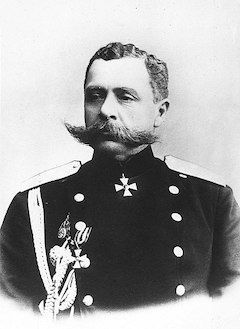On this date in 1918, Captain Alexey Schastny received the cold thanks of the Bolshevik government for saving its Baltic fleet.
 Icebound in the city of Helsingfors (Helsinki) across the Gulf of Finland from his Red homeland, Schastny (English Wikipedia entry | the more substantial Russian) orchestrated an emergency speedy breakout just ahead of a German incursion that seized the city in April and could have grabbed the Soviet Baltic fleet.
Icebound in the city of Helsingfors (Helsinki) across the Gulf of Finland from his Red homeland, Schastny (English Wikipedia entry | the more substantial Russian) orchestrated an emergency speedy breakout just ahead of a German incursion that seized the city in April and could have grabbed the Soviet Baltic fleet.
Schastny’s decisive action brought 236 vessels, including six battleships, across the frozen sea and safely home to Kronstadt.
The heroism of this operation at a moment of such low ebb for Russian prestige made Schastny a potentially dangerous element, should the onetime tsarist sailor choose to exercise his great prestige in the navy to the detriment of the Bolsheviks. This was the winter of the Russian Civil War, when White insurgents tore at the nascent Revolution.
Leon Trotsky, at this same moment scrambling to organize the Red Army to stabilize the situation, had Schastny arrested as a counterrevolutionary barely a month after the celebrated ice voyage. So grave a threat did this sea dog present that the Soviet state, having briefly abolished the death penalty, restored it in June 1918 specifically so that Schastny could be shot.
Schastny makes his appearance in the slick 2017 serial Trotsky, where he’s played by Anton Khabarov; the first half of episode 7 focuses heavily on Schastny’s arrest, court-martial, and execution.
On this day..
- 1568: Weyn Ockers, slipper slinger
- 1894: William Whaley, "the horror of the situation"
- 1936: Edward Cornelius, vicarage murderer
- 1940: Three saboteurs and a spy, "Fusilles et oublies"
- 1906: Richard Ivens, hypnotized?
- 1310: Badoer Badoer, Venetian rebel
- 1934: William Cody Kelley, the first in Colorado's gas chamber
- 1627: Francois de Montmorency and his second, for dueling
- 1535: Cardinal John Fisher
- 1669: Roux de Marsilly, employer of the Man in the Iron Mask?
- 1920: Dennis Gunn, hanged by a fingerprint
- 1711: Ifranj Ahmad, Janissary

 Paul Bolo was his proper name, and a striving, wandering soul was his fatal curse. “A rolling stone that gathered no moss,” says
Paul Bolo was his proper name, and a striving, wandering soul was his fatal curse. “A rolling stone that gathered no moss,” says 
 The Baltic German with the glorious Hungarian had spent a career in the tsarist officer corps; he took part in the multinational suppression of
The Baltic German with the glorious Hungarian had spent a career in the tsarist officer corps; he took part in the multinational suppression of 




 A labor activist for many years, Hjulgrén (
A labor activist for many years, Hjulgrén (